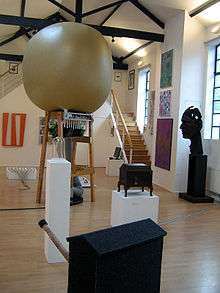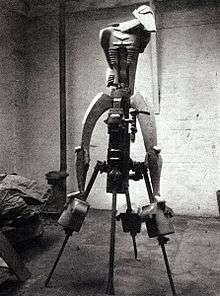The London Group


The London Group is a society based in London, England, created to offer additional exhibiting opportunities to artists besides the Royal Academy of Arts. Formed in 1913, it is one of the oldest artist led organisations in the world. It was formed from the merger of the Camden Town Group, an all-male group, and the Fitzroy Street Group. It holds open submission exhibitions for members and guest artists.
Overview
The London Group is composed of working artists. All forms of art are represented. The group functions democratically without dogma or style.[1] It has a written constitution, annually elected officers, working committees and a selection committee. There are usually between 80 and 100 members and an annual fee is charged to cover gallery hire and organisational costs. The group has no permanent exhibition venue and rents gallery space in London, most recently at the Menier Gallery, Bankside Gallery and Cello Factory. New members are elected most years, from nominations made by current members.[1]
History
The London Group was founded in 1913, when the Camden Town Group came together with the English Vorticists and other independent artists to challenge the domination of the Royal Academy of Arts, which had become unadventurous and conservative.[2]
The London Group emerged from a merger of the Fitzroy Street Group and the male member only Camden Town Group organization.[1] Founding members included the patron-artist Ethel Sands, artist Anna Hope Hudson,[3] Walter Sickert, Jacob Epstein, Wyndham Lewis and Henri Gaudier-Brzeska.[4] Another early female member was Marjorie Sherlock.[5] Throughout its history The London Group has held open submission exhibitions to encourage and support other artists struggling to get their work shown in public. The open submissions are shown along with the work of existing members and guest artists.[5] The exhibition Uproar! celebrated the first 50 years of the London Group in 1963 and it highlighted the role played by women and emigre artists in its membership.[6] In 2013-14 the Ben Uri Gallery celebrated The London Group's 100-year anniversary with an exhibition Uproar: The First 50 Years of The London Group 1913-1963 curated by Rachel Dickson and Sarah MacDougall.[4]
One of the oldest standing artist led organisations in the world The London Group continues to exist today with over 80 members. In 2011 the open exhibition presented over 140 artists at the Cello Factory. The group celebrated its 100th anniversary in 2013 with several shows, both historical and contemporary.[1]
See also
References
- 1 2 3 4 Redfern, David The London Group: origins and Post War history. 2008
- ↑ Wilcox, Denys J.The London Group, 1913-1939: the artists and their works. Scholar Press, 1995
- ↑ Ethel Sands. Tate. Retrieved 17 January 2014.
- 1 2 Dickson, Rachel ; MacDougall, Sarah; Baron, Wendy; Wilcox, Denys; Redfern David. Uproar: The First 50 Years of The London Group 1913-1963 published by Lund Humphries Publishers Ltd 2013.
- 1 2 Redfern, David. The London Group: A History. London Group, 2013.
- ↑ Review in Studio International from 1963